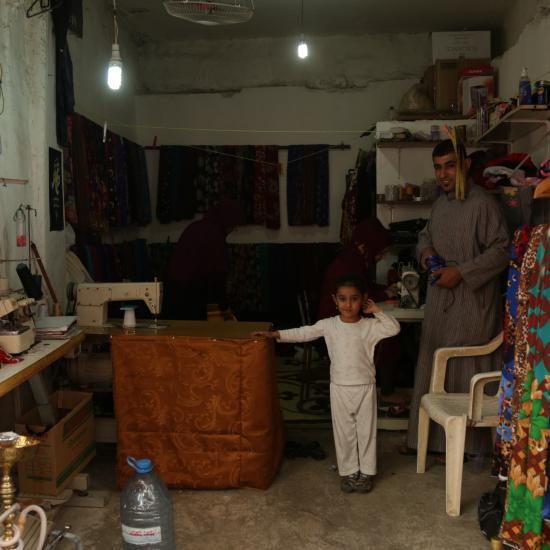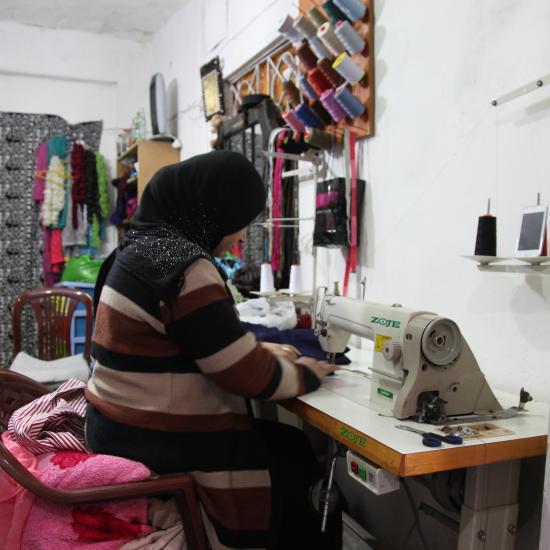By Farah Kodeih, IESEG School of Management, Aalto University School of Business; Henri Schildt, Aalto University School of Business; Thomas Lawrence, Saïd Business School.
Imagine you are forced to leave your country. You don’t know when or if you will be able to go back home. You find a place to stay, but everything there is temporary and uncertain. Your present life seems empty. And you feel powerless to direct your future. Omar, a Syrian refugee in Lebanon, describes it this way: 'Normally, you would look into the future and think I need to improve my situation and be in a better position. But our situation here does not allow us to think of tomorrow. Tomorrow doesn’t even exist for me.'
Omar’s statement will be familiar to millions of people around the world. Refugees, asylum seekers, and those in unstable work are often excluded from societal structures that would provide them with predictability, continuity, and control over their lives. Instead, they live in a state of ‘Indeterminate Temporariness,’ unmoored not just in space, but in time. A state of limbo where they are affected by forces beyond their control but feel unable to affect the world.
With the estimates of global refugee populations already at an all-time high, and the spectre of climate change migration looming, we saw a pressing need for organisations to find ways to help anchor those who are adrift.
Two important keys
We focused our research on the lives of Syrian refugees in Lebanon, and the work being done by a local non-governmental organisation (NGO) to ease their suffering. Based on in-depth interviews and field observations, we identified two critical concepts for those working with and/or funding marginalised groups.
1. Sheltering work
This is work that allows individuals to create a positive and empowered daily life within a local community. It's a way of reshaping how individuals experience their surroundings, providing immediate relief from uncertainty, rather than requiring long-term, institutional or geo-political changes. Creating opportunities for this kind of work shelters individuals from the most intractable and oppressive elements of their current situation.
2. Reframing Time
Additionally, we found that a person's experience of time is closely connected to their ability to act. For the powerless, a day can feel like an eternity; a year can feel like the blink of an eye. Either way, there is no sense that ‘Time is on my side.’ This can breed apathy and helplessness. Understanding how agency affects their experience of time can help marginalised individuals, and those supporting them, in their journey.
Why we chose Lebanon
Between 2011 and 2019, approximately 1.5 million Syrians fled the brutal civil war in their country and entered neighbouring Lebanon - eventually making up roughly 30% of that country’s resident population. The Lebanese government did not put out the welcome mat. Instead, they severely restricted the rights of Syrian refugees to work, invest, and move freely in the country. As the years have passed, the attitude of the Lebanese government has only hardened.
Constant threats of evictions and deportation orders have created widespread fear and insecurity among Syrian refugees that they might be forced out at any moment. All of this means that building a legitimate future in Lebanon feels impossible for many.

It gets to you. Without anything to do, you are on the verge of falling apart.
In the absence of state support for the refugees, local NGOs stepped in. They developed practices and informal infrastructures to help the population.
One in particular, Basmeh & Zeitooneh (B&Z), started a ‘small grants’ programme – to help refugees set up small businesses. Programme participants received entrepreneurship training, start-up funding and ongoing community support.
This small grants programme acted as a kind of ‘sheltering work’—giving people the ability to engage meaningfully in their day-to-day lives and develop plans for the near future, even while their long-term prospects were entirely uncertain.
Three Lessons to Learn
The programme suggests three lessons for other organisations who want to help marginalised groups take concrete steps while mired in uncertainty.
I don’t know if I am still going to be here in a year, or two. This is why I need to act now and build something.
1. One Foot in Front of the Other
Firstly, the NGO encouraged refugees to focus on short-term goals that would be feasible within the confines of their current lives. One trainer explained: 'We get them to think about the next six months because this is a more certain horizon.' This is key to offering a sense of control. And with control comes motivation. Zainab said the short-term focus helped drive her: ‘I don’t know if I am still going to be here in a year, or two. This is why I need to act now and build something.’
2. Home Sweet Temporary Home
Secondly, they designed the programme to shield participants from a hostile host country and to build a robust sense of local belonging. By ‘sheltering’ the refugees from many reminders of their powerless and uncertain position, the NGO enabled them to gain a degree of predictability and build a new sense of community. That sense of belonging fosters a renewed sense of hope. Nisrine told us that she loved being at the community centre: 'I come here a lot, there’s great positive energy, lots of laughter, and joking around, but also sharing our sorrows…Initially, I did not know anybody, and I really felt like a stranger. Now I know everyone.'

Until we can return, we cannot be just refugees waiting for things to happen, counting the days and regretting the past.
3. The Power of Routine
Finally, B&Z provides refugees with regular, meaningful activities to fill their everyday present: this included cultivating routines to structure their day-to-day lives and plotting incremental steps. This sense of busyness countered refugees’ apathy and directed their focus to what they could accomplish in the here and now.
Nahed talked about how the structure and routines helped her break out of the trance of passivity: 'They taught us how to organise our lives. I had no established routines. It was a bit random and chaotic…Until we can return, we cannot be just refugees waiting for things to happen, counting the days and regretting the past.'
Not a Magic Wand
Despite the evident relief provided by this programme, it was not a panacea for the participating refugees. Nor is it likely that a perfect form of ‘Sheltering work’ is possible. The world is still out there. The institutional, geopolitical, and economic forces are still powerfully influential. There is no happy ending for everyone.
In Lebanon, B&Z did not disrupt or dismantle the laws imposing uncertainty and rigid constraints on Syrian refugees. Instead, they created an alternative parallel timeline, in which the present had meaning and a better future was possible. For many of the refugees, their experience of entrepreneurship bolstered their resilience and allowed a sense of personal agency to return. Their hopeful outlook derived in part from a feeling of ‘movement’, that the present was leading to a better future
But movement can feel like free-fall. Hanadi was full of hope when she set up her home-based business making decorative rugs. She said the venture helped her escape. But she explained she feels hopeless again. ‘My husband was detained for working in a bakery, they fined him over lack of papers. . . since then it has been very difficult.’
Although setbacks and disruptions can trigger a return to the experience of present emptiness and disillusionment with future plans, sheltering work remains a powerful alternative to stagnation and passivity. The choice is how to use it to inform action rather than whether to do so.
Conclusion
With Syria’s refugees still displaced, we’ve watched Russia’s invasion of Ukraine spark the greatest movement of refugees in Europe since World War II; and we wait for the waves of expected climate migrants. There will be plenty of work to do, helping make the upended lives of refugees more meaningful and providing them with the tools to rebuild new lives.
In engaging with the Syrian refugees in Lebanon, we witnessed how hopelessness and passivity crept into the lives of refugees who lacked stability and predictability. Our analysis, however, revealed how entrepreneurial pursuits enabled by sheltering work could fill them with hope and tenacity.
We hope that future research and practical efforts will use these insights as inspiration to explore further how organisations can help marginalised individuals cope with upheaval.
Background
Research:
This article is based on the recent research paper Countering Indeterminate Temporariness: Sheltering work in refugee camps by
- Farah Kodeih, IESEG School of Management, Aalto University School of Business
- Henri Schildt, Aalto University School of Business
- Thomas B. Lawrence, Saïd Business School, University of Oxford
Their paper won the 2023 “Responsible Research in Management” Award
Photo credits:
Photos courtesy of the NGO Basmeh & Zeitooneh and of Emma Sandström, Aalto University



